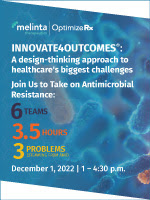Today’s guest post comes from Matthew Balogh, Head of Digital Marketing at Melinta Therapeutics.
Matt discusses the ongoing global problem of antimicrobial resistance (AMR). He suggests that lessons learned from the COVID-19 pandemic can inform both innovation in AMR therapies and our understanding of AMR.
To learn more about the global challenge of AMR and brainstorm solutions, request an invitation to Innovate4Outcomes®. This virtual event is presented by OptimizeRx in collaboration with Melina Therapeutics.
Read on for Matt’s insights.
Innovate4Outcomes®: Collaborating to Solve Antimicrobial Resistance
By Matthew Balogh, Head of Digital Marketing, Melinta Therapeutics
Now that the urgency of the COVID-19 pandemic is receding, it’s time to redouble our collective efforts to improve global preparedness for current and impending health challenges, and improvement of population health.
According to the World Health Organization (WHO), there are still enormous health challenges to be tackled. One of the top 10 threats to human health globally that WHO has identified is antimicrobial resistance (AMR). Bacteria are becoming resistant to antimicrobials faster than our industry is innovating new medicines to treat infections.
AMR is a silent, slow-moving pandemic in contrast to COVID-19, but there’s a significant global impact. Infections caused by AMR pathogens cause prolonged illness and, in some cases, disability or death, resulting in longer hospital stays, creating or compounding financial challenges for those directly affected, and indirectly impacting the community through collateral damage (i.e., the spread of AMR pathogens). According to a recent study published in The Lancet, bacterial AMR is now a leading cause of death worldwide.
Antimicrobials are therapies that include antibiotics, antivirals, antifungals and antiparasitics. They are used to treat and prevent infections. Human healthcare providers across the globe deal with challenges related to drug-resistant infections every day, with various external factors influencing treatment and prevention. Persistent issues such as lack of clean water and sanitation, economic constraints, and education and communication about disease and prevention are only a few of the obstacles. AMR is a leading cause of death globally, with the highest burdens in low-resource settings. According to the same Lancet study, predictive modeling estimates that there were an estimated 4.95 million deaths associated with bacterial AMR in 2019 worldwide.
According to the Centers for Disease Control and Prevention, someone in the United States contracts an antibiotic-resistant infection roughly every 11 seconds, and four people die each hour from those infections. A leading cause of death worldwide, AMR now kills more people worldwide than HIV/AIDS or malaria.
The Partnership to Fight Infectious Disease is specific in singling out COVID-19 as a catalyst to more deaths from AMR while using this moment as a call to action to solve this global threat. According to the group, “Many deaths attributed to pandemics like COVID-19 are due to secondary infections caused by antibiotic-resistant ‘superbugs.’ Antibiotics and antifungals underpin modern medicine, and growing antimicrobial resistance jeopardizes people’s health and the entire health system.”
Misuse and overuse of antimicrobials give rise to drug-resistant pathogens. The COVID pandemic contributed to this misuse due to several factors, not the least of which was the unpredictable behavior of this new virus in the first days and months of this global health crisis. During the early months of the pandemic, about 80 percent of patients hospitalized with COVID received an antibiotic. In tandem, AMR-resistant infections and deaths in hospitals spiked by 15 percent in 2020. Clearly, ground has been lost.
Without effective treatments for drug-resistant infections, patients lose not just protections against infectious diseases, but also other medical advances that rely on effective treatment and prevention of hospital and community-acquired infections. Even routine procedures and surgeries involve greater risk from the rise in antimicrobial-resistant infections.
Treatment is not the only option and isn’t the only solution to continued aggressive action addressing this urgent threat. The CDC has suggested approaches to heading off these problems, and as the pandemic so dramatically demonstrated, stopping the spread of germs before they can cause an infection. This includes supporting the healthcare community to improve antimicrobial use and prevent infections from occurring in the first place. Organizations like the Antimicrobial Working Group, of which Melinta Therapeutics is a member, are committed to advancing public policy that will change the landscape by working to pass important congressional acts, including the DISARM Act and The PASTEUR Act to stimulate innovation in the antibiotic space. But what else can be added to the arsenal?
This is a point in history where we can learn from COVID and turn toward a future where challenges are met with collective creativity. Challenges of this scale require innovative, collaborative and creative problem-solving to tackle. The pandemic demonstrated the importance of working together, having a common set of treatment guidelines, and clear communication with everyone involved. Now is the time to consider how a broad dialogue can impact the health outcomes of the future.
This December, the third annual Innovate4Outcomes® healthcare design-thinking event, presented by OptimizeRx in collaboration with Melina Therapeutics, offers a chance to ideate approaches to the problem of AMR. The half-day virtual event will delve into three facets of this global challenge: lack of innovation in therapies, provider resources related to innovation, and health equity. Six teams, consisting of HCPs, life sciences professionals, experts in artificial intelligence and real-world evidence will join marketers and other healthcare communicators to brainstorm ways to address the societal challenge of AMR.
Invitations to this groundbreaking event are limited. Visit this link to request one.
Sponsored guest posts are bylined articles that are screened by Drug Channels to ensure a topical relevance to our exclusive audience. These posts do not necessarily reflect our opinions and should not be considered endorsements. To find out how you can publish a guest post on Drug Channels, please contact Paula Fein (paula@DrugChannels.net).



No comments:
Post a Comment